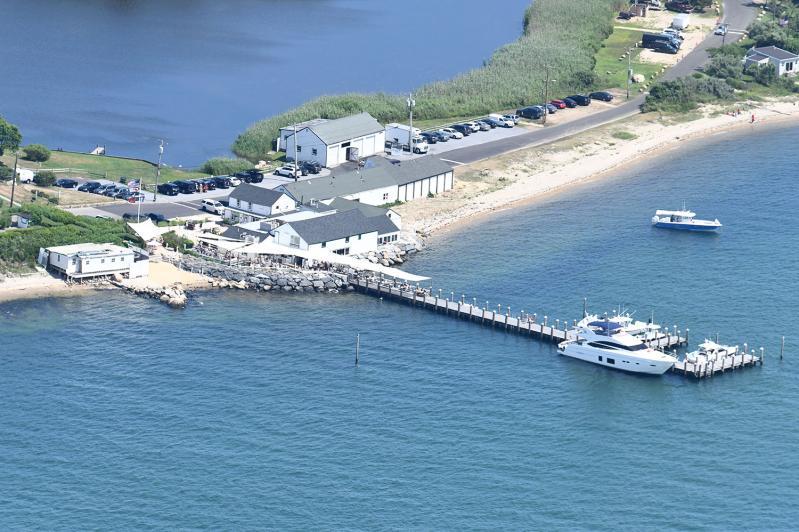Outside counsel for East Hampton Town in its long-running dispute with Duryea’s Lobster Deck on Fort Pond Bay in Montauk asked a New York State Supreme Court justice last week to vacate a 2019 order allowing a certificate of occupancy to remain in effect, hold its corporate ownership in contempt of that order, and allow the town to enforce its zoning code with respect to the property.
Steven Stern, outside counsel for the town, wrote to Justice David T. Reilly on Friday that Duryea’s, a Montauk institution that was bought by the billionaire investor Marc Rowan in 2014, had posted on its Instagram account photos showing indoor seating, by which he said Duryea’s “illegally converted a limited outdoor food service establishment into a full-blown restaurant and event space.”
The Aug. 28 Instagram post followed the May 3 discovery by Bruce Schiavoni, the fire marshal, that workers were building an exterior wood frame structure that Mr. Stern said would change and expand dining operations, without having obtained a building permit. Also in May, Mr. Stern wrote, the town learned that Duryea’s had increased its outdoor seating footprint by opening a new dining area in a previously vegetated section of the property, justifying the move with an expired emergency order that temporarily allowed an expansion of food service establishments to comply with social distancing requirements during the pandemic.
These, he said, are in violation of Justice Reilly’s May 31, 2019, ruling allowing the certificate of occupancy, issued in February of that year but which the zoning board was considering rescinding, to remain in effect. He also ruled that Mr. Rowan’s corporation, Sunrise Tuthill, “shall continue the operations on the subject property in the same manner as it has operated in the last two years and shall make a good faith effort to work with the community to effectuate a positive environment for all concerned.”
A 1997 zoning board decision held that a restaurant on the site was not a pre-existing use, and that there had never been table service; rather, that the only pre-existing nonconforming use on the property was a fish market.
Following Mr. Rowan’s purchase of Perry B. Duryea & Son Inc., several neighbors expressed concern over expanding use on the property, which they said was encroaching on their own properties in the form of increased traffic, pollution, and environmental damage. Residents of the Tuthill Road Association launched a GoFundMe campaign in 2019, which they said was necessary to protect the neighborhood’s character and quality of life from activities associated with Duryea’s.
“Montauk’s oldest neighborhood is up against a billionaire hedge funder who has sued the town multiple times to get his way,” the campaign’s page at GoFundMe.com said.
Attorneys for Mr. Rowan asserted that a dining deck and seafood shop where food is prepared and eaten had existed in the same configuration for more than 75 years. Mr. Rowan, one attorney told the zoning board, had inherited a long-running “blood feud” between Duryea’s and the Tuthill Road Association.
Mr. Rowan had sued the town three times in 2018: once to have the court compel the town to issue a certificate of occupancy to legalize existing uses and structures; a second time to assert that the town has no jurisdiction over the property’s dock, underwater lands, and shoreline fortification structures, and a third time to change the zoning for a portion of the property from residential to waterfront business.
A settlement with the town was announced early in 2019. But the settlement was signed by Michael Sendlenski, who was then the town attorney, and not Supervisor Peter Van Scoyoc, nor did the town board vote on a resolution authorizing the settlement before it was finalized. Following public criticism of the settlement, the town board hired outside counsel to advise it on litigation involving Sunrise Tuthill, and that attorney said the settlement was invalid and should be vacated. Justice Reilly issued a temporary restraining order suspending implementation of the settlement, but took no action with respect to the certificate of occupancy.
Mr. Rowan subsequently filed two additional lawsuits, one seeking to compel the Building Department to issue a building permit for the installation of an alternative innovative septic system, the other to prohibit the zoning board from rescinding the certificate of occupancy.
In August of 2019, the zoning board voted to revoke the certificate of occupancy it had issued earlier that year. The vote, however, was nonbinding, Justice Reilly’s May 31 order having asserted the court’s jurisdiction and directing that the certificate of occupancy remain in effect pending further order. The zoning board’s revocation was thus stayed.
Mr. Stern said on Tuesday that an order to show cause was signed on Monday, compelling Mr. Rowan’s representatives to respond. An Oct. 11 in-person appearance was set for that response.
Gayle Pollack, an attorney representing Sunrise Tuthill, did not respond to an email seeking comment.




